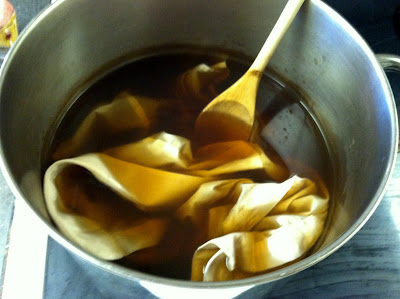Happy November!! To me, Thanksgiving means giving a lot of thank you cards. Here is one I made recently:
It's a mini card (about 2.5 inches across and 3.5 inches tall) the perfect size for attaching to a treat. Copy and paste it into word (you can fit four to a page), and print on card-stock.
November 11, 2012
November 7, 2012
Tea Staining: From White to Ivory
 |
| Before |
So being the cheap soul that I am, I took a tip from Mrs. Forrester ( I hope you've all seen Cranford) and decided to "improve the color" on my own.
Here's what you need:

Fabric to be dyed
Lipton Tea (amount depends on the depth of color you are trying to achieve)
Stock Pot
Wooden spoon
Water
Vinegar
Directions
1. Fill a large stock pot with 20 cups of water.
2. Place the fabric to be stained in a large pot and fill with water, making sure the fabric is completely covered with a bit to spare. If needed add more water.
3. Remove the fabric and squeeze as much of the water out as possible (back into the pot.) Set fabric aside.
4.Bring the water to a boil, then turn off heat.
5. For 20 cups I used 4 teabags. A very "safe" ratio is 1 tea bag to 5 cups water. If you want a darker ivory or tan color use more tea. Add the tea bags to the hot water and allow to steep for about 3 minutes.

6. Remove the tea bags.
7. IMPORTANT! Let the tea sit until warm or you will burn your hands wringing out the fabric!
8. Place the fabric to be stained into the tea. Stir around to make sure the tea gets into all the folds and pockets of the fabric.

9. Allow to sit for a minimum of five minutes. The longer it remains in the tea, the darker the stain will be. Check periodically on the color, keeping in mind that it will lighten as it dries.
10. Wring out the fabric well, then rinse in cold water to remove excess acids from the tea.
11. Rinse well with vinegar, to set the dye in the fabric. The vinegar can be used straight, or diluted up to one part in ten in water for larger pieces where using so much straight vinegar would be cost prohibitive.

12. Use a dryer to dry the fabric.
13. Wash thoroughly as normal, to remove any remaining tea and vinegar.
I promise there is a difference, it just isn't drastic. You can play around with your recipe/sitting time to achieve whatever hue you want!
 |
| After |
November 2, 2012
Rescued Skirt and Necklace
 Before you throw something away that appears unusable, think outside the box, and you may be able to prolong the life of whatever you were going to get rid of.
Before you throw something away that appears unusable, think outside the box, and you may be able to prolong the life of whatever you were going to get rid of.
Example #1 is a dress with a high waist that had gotten too short for my daughter (rather, she had gotten too tall). She loved it and was sad to think of giving it away, so she became resourceful and cut off the top of the dress above the elastic waist, folded the raw edge under, and with no sewing, it became a skirt that is plenty long for her! I'm proud of her for the genius idea and grateful that she's saving me money by wearing it longer!
Example #2 is a necklace who's beads were chipping and peeling and therefore looking very shoddy. I was ready to toss it when I had an idea: paint over the chipped areas with matching nail polish! It's good as new now, and I don't have to run out and buy another red necklace.
Subscribe to:
Comments (Atom)


